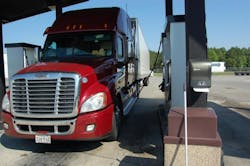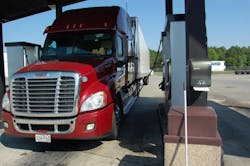And it wasn’t too long ago, either.
I remember filling up my old green Jeep four-door Sport (I do miss that vehicle) for less than a $1 a gallon at one point in 1999.
Indeed, Ford Motor Co. got so confident that low oil prices – and thus low fuel prices – were becoming a permanent fixture of the economic landscape that it greenlighted its Excursion sport utility vehicle (SUV) behemoth.
Then it all changed – fast. By 2000, truckers were protesting on Capitol Hill about high fuel prices, to the point where many called for freight to be re-regulated.
We went through another similar boom cycle in oil and fuel prices during the heady 2007-2008 timeframe, when diesel fuel in particular exploded from under $1.50 a gallon to over $4 a gallon in a mere 12 months. Then the Great Recession hit and everything went from bad to worse for a long while.
Yet now, here we are again, with a global crude oil glut helping to trigger a crash in both oil and fuel prices – courtesy of a petroleum production renaissance of sorts in the U.S.
So the question for trucking is this: will crude oil and fuel prices stay at these low levels? Or will we again witness them take off for the stratosphere?Well Nariman Behravesh (at right), chief economist for global consulting firm IHS Inc., for one, believes many of today’s economic trends are reminiscent of the 1980s and 1990s, creating what he calls a ‘Back to the Future’ scenario for the global economy.
“Once again the U.S. is a locomotive of global growth, the dollar is resurgent and U.S. oil production is set to be the highest in the world,” Behravesh noted in a presentation at the World Economic Forum in Davos, Switzerland, this week.
“Everyone right now is talking about the impact of the oil price plunge,” he pointed out. “While clear winners and losers are being created, the net effect will be positive as roughly $1.5 trillion in wealth is transferred from producers of oil to consumers of it. This will translate to an additional 0.3 to 0.5 percentage point to world growth.”
Behravesh is also using a much older reference point than the ones I noted above: the 67% percent drop in oil prices in 1985 and 1986 that helped trigger what he called a “global boom.”
Yet he stressed that the global economic environment is very different today compared to three years ago – meaning another such “boom” may not be in the offing – this big drop in oil prices will help growth.
“Despite multiple divergent trends, global growth is likely to accelerate a little in 2015,” Behravesh said. “Falling oil prices and more stimuli from key central banks will boost global growth in 2015 to 3.0% from 2.7% in 2014.”
In particular, he believes U.S. growth will “remain solid,” despite weakness in other parts of the world and plummeting oil prices.“The U.S. economy should be able to grow by 3% in 2015 without too much trouble,” Behravesh indicated. “Strong domestic demand growth will, as it has in the past, provide a strong foundation and buffer for the U.S. economy.”
How will all of this impact trucking? Well David Ross, managing director at Wall Street investment firm Stifel Nicolaus & Co. noted recently that declining fuel prices will actually be something of a mixed bag for motor carriers.
“Just as lower oil leads to better prices at the pump for consumers, it also leads to lower fuel costs for transportation providers,” he explained. “But since the late 1990s, most contractual rate agreements with shippers include a fuel surcharge, which fluctuates with changing prices. So, as the cost of diesel goes down, for example, a trucker's revenue and expenses both decrease.”
In general, Ross noted that TL carriers have the least compensatory fuel surcharge, as they still have to pay for the fuel burned outside of miles traveled to serve a shipper, while parcel, LTL, and railroads recoup a percentage of revenue to cover fuel cost increases, which typically make them “whole.”
“’Empty miles’ for TL carriers are generally in the range of 10%-15% of total miles,” he added. “Furthermore, excess fuel burned while stuck in traffic and ‘out of route miles,’ time spent idling while waiting to pick up or receive a load, etc., will all add to expenses—and lower diesel costs reduces this burden.”
But, for the more fuel efficient carriers, lower diesel prices may actually work against those companies which are made more than whole from their fuel surcharge programs, Ross stressed.
“For example, if a carrier gets 8 MPG as a result of a brand new fleet, aerodynamics, driver technique/training, etc., yet the shipper uses a more normalized 6.5 MPG to calculate the surcharge—the carrier makes money,” he pointed out. “But if that benefit exceeds the costs associated with the unpaid fuel expenses listed above, this could serve to make lower diesel prices a slight headwind for the most fuel efficient fleets—a category which most of the large, public TL carriers fall into.”
Something to keep in mind as 2015 rolls on.



